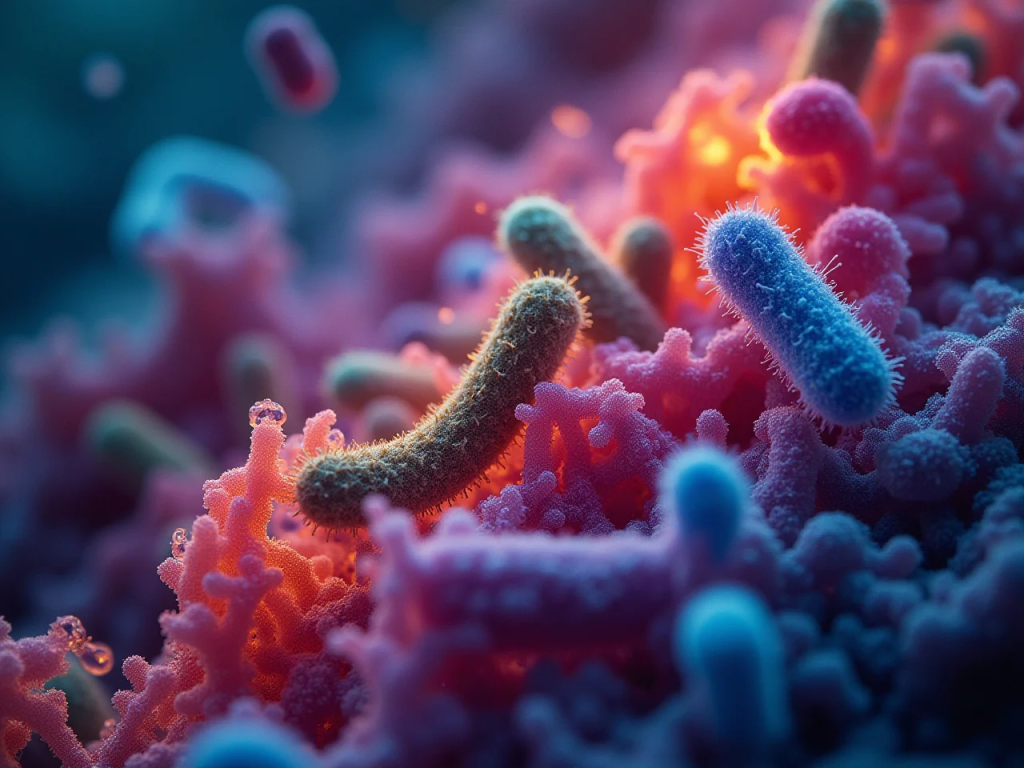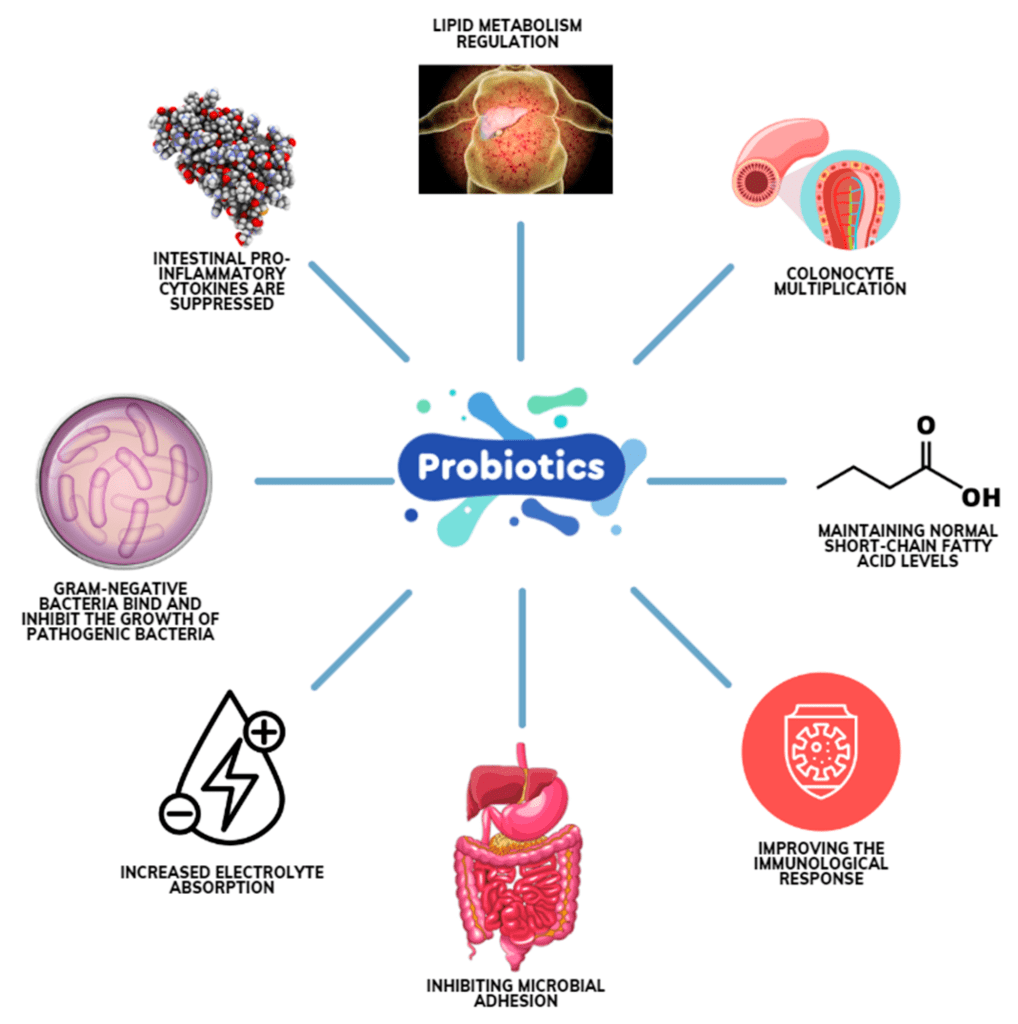Gut health has become a hot topic, with probiotics, fermented foods, and herbal remedies widely promoted for improving digestion. However, the conversation often presents a confusing contradiction: If probiotic foods promote good bacteria, wouldn’t antibacterial herbs like oregano destroy those beneficial microbes?
The truth is, gut health isn’t as simple as labeling bacteria as good or bad. Instead, the key lies in maintaining a balanced gut environment to prevent overgrowths that lead to bloating, heartburn, and other digestive issues. Let’s dive deeper into understanding how bacteria impact gut health and how you can eliminate harmful bacteria while protecting beneficial microbes.
The Role of Gut Bacteria in Digestion

Your gut is home to trillions of bacteria, some of which aid digestion, while others can cause problems when they multiply excessively. A well-balanced microbiome ensures that beneficial bacteria regulate digestion, support immune function, and prevent harmful microbes from taking over.
Think of your gut like a national park—every species plays a role. If one species overpopulates, the ecosystem falls out of balance. The same happens in your digestive system when certain bacteria overgrow due to poor diet, stress, or antibiotic use.
Common Culprits Behind Bloating and Heartburn
Several bacteria and yeasts can trigger bloating and acid reflux by fermenting food too aggressively or producing excess gas. Some of the most notorious ones include:
- H. pylori – A common cause of acid reflux, ulcers, and indigestion.
- Clostridium difficile (C. difficile) – Can lead to severe diarrhea and inflammation when overgrown.
- E. coli – While some strains are harmless, others cause bloating and stomach pain.
- Candida (Yeast Overgrowth) – A yeast that can disrupt digestion and lead to bloating, fatigue, and inflammation.
If these microbes become dominant, they can lead to chronic digestive discomfort, food intolerances, and even long-term health issues.
Video : How to Wipe Out Bad Bacteria in the Stomach
How to Eliminate Harmful Gut Bacteria Naturally
Instead of trying to kill off all bacteria, the key is to reduce overgrowths while maintaining balance. Here’s how you can do it:
1. Starve the Harmful Bacteria
Harmful bacteria thrive on sugar, refined carbs, and processed foods. By cutting these out, you make it harder for them to survive. Avoid:
- White bread, pasta, and pastries
- Sugary snacks and sodas
- Artificial sweeteners (which can disrupt gut bacteria)
Instead, opt for fiber-rich whole foods that nourish good bacteria, such as vegetables, legumes, and nuts.
2. Use Natural Antimicrobials
Certain herbs and spices help eliminate bad bacteria without wiping out beneficial microbes. Some of the best natural antibacterial agents include:
- Oregano oil – Powerful against bacterial overgrowths like SIBO (small intestinal bacterial overgrowth).
- Garlic – Contains allicin, which helps fight H. pylori and Candida.
- Thyme and rosemary – Act as natural antibiotics without disrupting gut flora balance.
- Berberine – A plant compound effective in eliminating harmful bacteria while supporting digestion.
These can be taken as supplements or used in cooking to support gut health.
3. Restore Balance with Probiotics and Prebiotics

Once harmful bacteria are under control, it’s essential to repopulate the gut with beneficial bacteria. Foods that help include:
- Probiotic-rich foods: Yogurt, kefir, sauerkraut, kimchi, and miso.
- Prebiotic foods: Bananas, onions, garlic, and oats (these feed beneficial bacteria).
For more severe bacterial imbalances, consider high-quality probiotic supplements that contain strains like Lactobacillus and Bifidobacterium, which support digestion and immune function.
Signs That Your Gut Bacteria Is Out of Balance
How do you know if bad bacteria have taken over your gut? Here are some common symptoms:
- Chronic bloating and gas – Persistent bloating is often caused by bacterial fermentation in the intestines.
- Acid reflux and heartburn – H. pylori overgrowth can trigger excessive stomach acid.
- Frequent indigestion and stomach pain – Could indicate an imbalance in digestive bacteria.
- Fatigue and brain fog – Harmful bacteria produce toxins that affect energy levels and mental clarity.
- Frequent yeast infections or fungal issues – Candida overgrowth can manifest in skin and nail infections.
If you notice multiple symptoms, addressing gut bacteria might be the solution.
Lifestyle Habits That Support a Healthy Gut
Aside from diet, certain lifestyle habits can prevent harmful bacteria from taking over:
1. Stay Hydrated
Drinking enough water helps flush out toxins and supports healthy bowel movements, preventing bacteria from stagnating in the gut.

2. Reduce Stress
Chronic stress alters gut bacteria and increases inflammation. Practices like meditation, deep breathing, and regular exercise can help restore gut balance.
3. Get Enough Sleep
Poor sleep can disrupt gut bacteria and increase cravings for sugary, processed foods, which feed harmful microbes. Aim for 7-9 hours per night.
4. Avoid Overusing Antibiotics
Antibiotics kill both good and bad bacteria, disrupting gut balance. Only take them when absolutely necessary and follow up with probiotics to restore healthy bacteria.
When to Seek Medical Help
While most bacterial imbalances can be managed naturally, there are times when you should see a doctor:
- Severe or persistent bloating and abdominal pain
- Unexplained weight loss
- Chronic diarrhea or constipation
- Symptoms of an H. pylori infection (constant acid reflux, nausea, stomach ulcers)
A medical professional can run gut microbiome tests or perform a stool analysis to determine if harmful bacteria are causing your symptoms.
Video : How to Kill The Bacteria Causing Heartburn And Bloating!
Final Thoughts: The Key to a Healthy Gut
Eliminating harmful gut bacteria isn’t about destroying all microbes—it’s about restoring balance.
By making simple dietary changes, incorporating natural antimicrobials, and supporting beneficial bacteria, you can:




Taking care of your gut is one of the most important things you can do for your overall health. Start making small changes today, and your digestive system will thank you!
When this Teen Daughter Leaves Mother in Favor of Cheating Father

The course of one woman’s life took a sharp turn when she entered into marriage with a wealthy man, believing he would be a blessing to her family. Sharing her story on Reddit, she recounted his acts of generosity, from lavishing expensive gifts upon her parents to settling her sister’s credit card debts and securing a lucrative job for her brother at a prestigious firm. Despite his infidelity, her husband remained faithful to her, garnering admiration from her in-laws for his unwavering support during tough times.
The first crack in their marriage surfaced soon after the birth of their daughter, Kelly. Faced with the dilemma of leaving her husband, she sought counsel from loved ones, yet found herself unable to take decisive action, convincing herself that his infidelity stemmed from her perceived inadequacies as a wife during pregnancy. The second instance of betrayal occurred when Kelly was around 12 years old, prompting her mother to seriously consider divorce.

Despite her resolve to end the marriage, familial pressures, fueled by a desire to avoid scandal, weighed heavily against her. Reluctantly, she proceeded with the divorce, though custody battles left her without Kelly by her side, despite receiving alimony and a fair settlement.
Painted as the antagonist by her in-laws and parents, she faced an uphill battle to maintain a connection with her daughter. Only her steadfast friend Tina provided solace and support through the ordeal, serving as both confidante and anchor during tumultuous times.
Though she extended financial support for Kelly’s education, the rift between mother and daughter persisted, exacerbated by stringent conditions outlined in her will. Kelly, however, forged her own path, pursuing an accounting degree and a successful career, distancing herself from her mother’s inheritance to assert her independence.

Life, however, has a way of reshuffling the deck. Kelly, now financially self-reliant, sought to mend bridges with her mother, especially as her father’s fortunes dwindled, leaving her college fund depleted. This unexpected turn of events led to a tentative reconciliation, with Kelly relinquishing her claim to her mother’s estate in exchange for support for her graduate studies.
In a twist of fate, Laura, the woman’s goddaughter, emerged as the primary beneficiary in her will, sparking familial discord and bitterness over the perceived injustice.



Leave a Reply